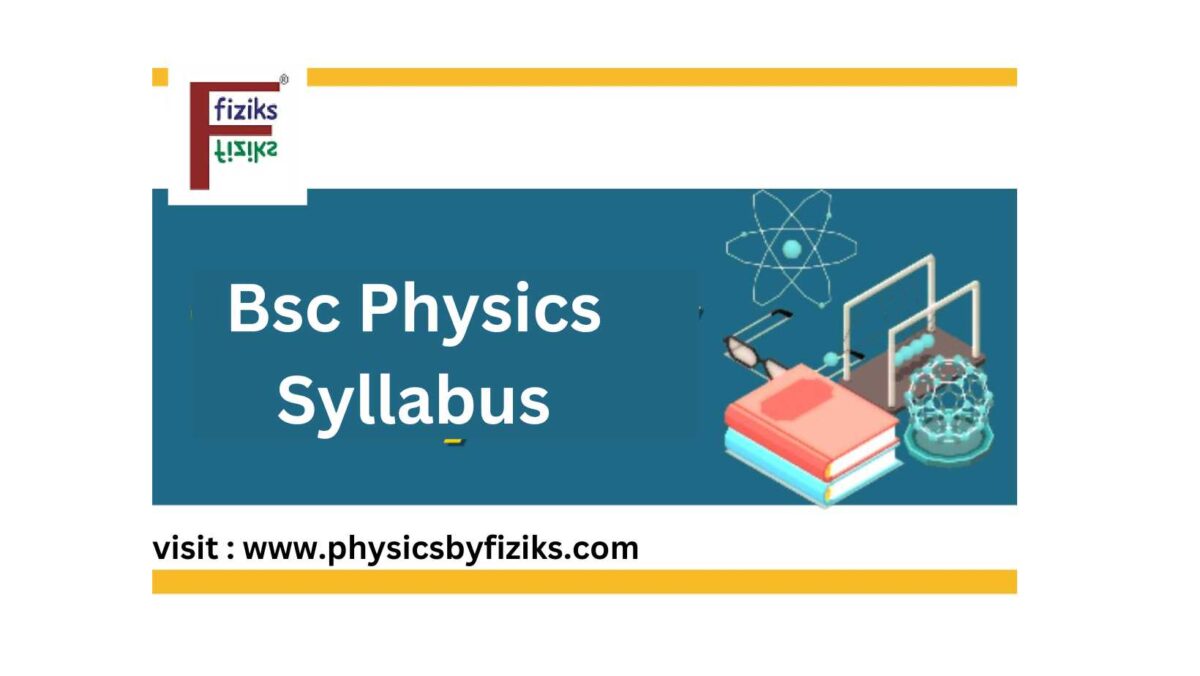Check Out Complete BSC Physics Syllabus And Course Structure

BSC in Physics is considered to be one of the most important and tough courses in the science stream. This course deals with different aspects that are related to natural sciences, such as magnetism, thermal dynamics, electronics, optics, electro dynamics, power, energy and much more.
A lot of students in today’s time wishes to do this course, looking at the boom of science and technology, but it is also very important for them to have a look at bsc physics syllabus and course structure before going for it, so that they can understand what they are going to study in next 3 years and if they can really do it. And so to help you out with this, we got everything covered through this article.
As you scroll down, you will find out complete details about the BSC Physics Syllabus, such as the detailed syllabus of it on a yearly basis, the course structure of the programme, projects included and much more. So just continue to read below to check out all the info.
Details of bsc physics syllabus on yearly basis
BSC in Physics is a 3 year long degree which includes a proper and multidisciplinary syllabus that gives both practical and theoretical knowledge to the students. The course is divided into 3 years which has 2 semesters each, and so there are a total of 6 semesters. So below provided is a year wise syllabus for your better understanding-
1. BSC Physics 1st year syllabus–
Subjects in 1st Semester-
- Mechanics and Properties of Matter
- Electricity and Magnetism
- Physical Chemistry 1
- Mathematics Physics 1
- MIL or English Communication
- Foundation course on mathematics
- Physics Lab 1
Subjects in 2nd Semester-
- Calculus
- Optics and Waves
- Organic Chemistry
- Digital Applications and System
- Environmental Studies
- Waves and Optics Lab (Practical)
- Physics Lab 2
2. Bsc physics syllabus of 2nd year-
Subjects of 3rd Semesters are-
- Inorganic Chemistry 1
- Thermal Physics
- Solid state physics
- Radiation Science and Biophysics
- Analog systems and applications
- Open Elective
Subjects in 4th Semester are as-
- Mathematical Physics
- Basic electronics
- Nuclear Physics
- Classical Relativity and Mechanics
- Thermal Physics Lab (practical)
- Analog Systems and Applications Lab
3. BSC Physics 3rd year syllabus-
Subjects in 5th semester are as follows-
- Applied Options
- Oscillations and Waves
- Quantum Mechanics
- Statistical Mechanics
- Electromagnetic Theory
Subjects in 6th semester are as-
- Molecular and Atomic Physics
- Instrumentation
- Renewable Energy
- Astrophysics and Particles
- Quantum Mechanics
Course Structure of BSC Physics
The whole course structure of BSC Physics follows a similar pattern like any other program of BSC. BSC in Physics is an undergraduate course which is of 3 years and has been divided into 6 semesters. The bsc physics syllabus is spread wide and consists of both theoretical and practical classes to deeply enhance the knowledge of students. The course structure of this course also incorporates a lot of lab classes to give physical training to the students.
The whole syllabus of BSC Physics is designed in such a way that it gives in-depth knowledge of technical and scientific aspects of physics. The course structure also consists of submission of projects on different topics to make sure that they have complete knowledge about the project that they were submitting as a part of course.
The teaching methods of teachers in BSC Physics is also a lil different from other courses. Apart from conducting regular classes, students are also taught using video lectures and PowerPoint presentations. Students are also exposed to lab classes and practicals so that they can understand everything better and get hands-on training for different concepts which are associated with Physics. Some of the most common techniques which are used in BSC Physics training are scientific method skills, discovery, deductive methods, technical skills and more.
As students complete this course, they get quite familiar with the recent and existing technological and scientific advances. Even though the course structure might vary from college to college, the essence of it completely remains the same. But a common structure of this course includes the following-
- 6 semesters
- Lab experiments
- Practicals
- Submission of Project
Projects included in bsc physics syllabus
BSC Physics is a natural science which basically studies matter through time and space. This deals with all the basic concepts of magnetism, electricity, power and more. In a wider sense, this course can also be looked at as the study to understand how nature works. Students carry out a wide range of projects during the BSC Physics course. List of some of the most common projects completed by students are as follows-
- A study into the energy gap in superconductors
- Designing and Construction of an antenna booster
- Study on the effectiveness of solar power
- The phenomenology of jets in the astrophysics
- Applications and construction of heat sensors
Best books to cover bsc physics syllabus
Taking help of reference books to cover the syllabus of BSC Physics is like a booster dose for the students to help understand the course better. Books of BSC Physics helps the students to get in-depth knowledge and improve their theoretical concepts for all the subjects of this course. But as there are a lot of books available to study from, we have provided below the names of some of the best ones for each subject, so just check out.
- Modern Physics- Chris D Zafiratos, John R Taylor
- Oscillations and Waves- N K Bajaj
- Optics- GR Pickrell and G Kaur
- Mechanics- D S Mathur
- Quantum Mechanics- David J Griffiths
- Physics for the degree students- C L Arora
- Concepts of modern physics- Arthur Beiser
- Elements of properties of matter- DS Mathur
- Classical mechanics- Hebert Goldstin
Thus, this is complete information on the bsc physics syllabus on yearly basis, its whole course structure and the projects included in the course. So if you are thinking of pursuing a career in Physics, do read out the whole article to get a detailed idea on the same, so that you can decide whether you still want to pursue a degree and career in Physics or not.







